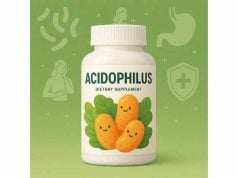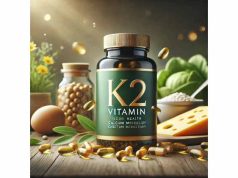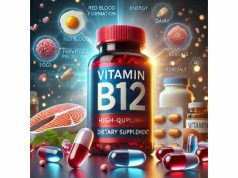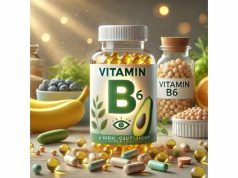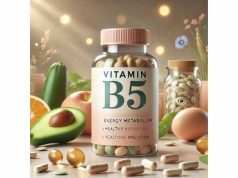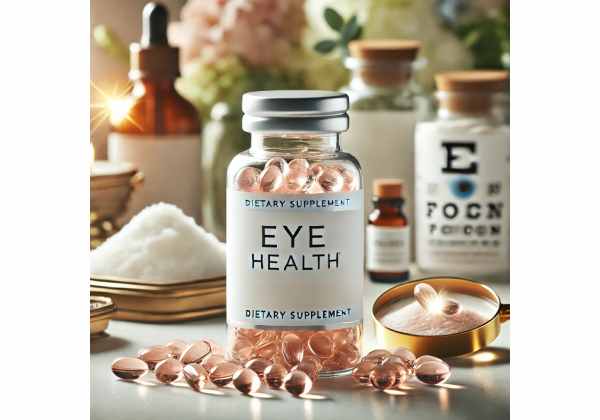
Collagen peptides, commonly recognized for supporting skin elasticity and joint health, have recently drawn attention for their role in enhancing ocular wellness. By contributing to the structural integrity of eye tissues and promoting healthy circulation, collagen peptides may help maintain sharp, comfortable vision. Whether you’re experiencing dryness, mild strain, or simply want to protect your eyes as you age, adding collagen peptides to your regimen could offer valuable benefits. In this article, we’ll explore how collagen peptides improve vision, discuss key advantages for overall eye health, and provide guidance on usage so that you can make an informed choice about this powerful supplement.
Table of Contents
- Defining Collagen Peptides and Their Composition
- Influence of Collagen Peptides on Visual Clarity
- Crucial Advantages for Ocular Health
- Recommended Strategies for Taking Collagen Peptides
- Examining Studies and Evidence
- Frequently Asked Questions
- References and Sources
Defining Collagen Peptides and Their Composition
Collagen peptides are short-chain amino acids derived from the breakdown of collagen, the most prevalent protein in the human body. This protein forms a significant structural component in skin, bones, and connective tissues—and importantly, in various parts of the eye. Through the hydrolysis process, long collagen molecules transform into more easily absorbed peptides, making them a popular supplement for those looking to replenish essential building blocks.
The Biological Importance of Collagen
- Structural Support: Collagen fibers maintain the shape and integrity of tissues. In the eye, they help preserve the shape of the cornea and sclera, ensuring correct light refraction and ocular strength.
- Flexible Reinforcement: Because collagen is both strong and elastic, it lends resilience to delicate structures like the vitreous humor and lens capsule.
- Healing and Regeneration: New collagen formation can assist in tissue repair following damage or degeneration, underlining the importance of sufficient collagen availability.
Differences Between Collagen Types
There are multiple collagen variants in the body, each fulfilling distinct roles:
- Type I: Common in skin, bone, and scleral tissues.
- Type II: Primarily found in cartilage, but also relevant for parts of the eye that rely on supportive cartilage-like structures.
- Type IV: Integral to basement membranes, including those in the retina.
Commercial collagen supplements often center on types I and III, although advanced formulas may provide a blend for more comprehensive tissue support.
Sources of Collagen Peptides
Collagen peptides are commonly sourced from:
- Bovine (Cattle): Rich in type I and III collagen.
- Marine (Fish): Known for enhanced bioavailability and containing mostly type I collagen.
- Porcine (Pig): Another frequent source for type I collagen extraction.
In their peptide form, they typically dissolve seamlessly into beverages or foods, allowing easy integration into daily routines. While they’re often associated with skin and joint care, their impact on ocular tissues is increasingly recognized, prompting more individuals to seek out high-quality collagen supplements for eye health.
Influence of Collagen Peptides on Visual Clarity
Collagen Peptides Improves Vision predominantly by fortifying the structural components of the eye and aiding in tissue repair. By ensuring stable scaffolding and promoting healthy fluid dynamics, these peptides may offer both immediate comfort improvements and longer-term protective measures against age-related changes.
Strengthening the Cornea
The cornea is the transparent, dome-shaped front portion of the eye, vital for focusing incoming light. Collagen fibrils, arranged in precise parallel patterns, lend clarity and shape. Enhanced collagen supply via supplementation might:
- Preserve Curvature: Maintaining the ideal shape to refract light accurately onto the retina.
- Aid in Wound Recovery: For minor abrasions, adequate collagen can speed epithelial healing, reducing scarring risks and sustaining corneal transparency.
Reinforcing the Vitreous Body
Filling the space between the lens and retina, the vitreous humor is a gel-like substance reliant on collagen for its mesh-like network. Over time, structural disruptions can lead to floaters or partial liquefaction:
- Potential Reduction in Floaters: With improved collagen fiber integrity, the vitreous may be less prone to protein clumps that manifest as floaters.
- Support for Retinal Attachment: A healthy vitreous exerts gentle outward pressure, helping the retina remain properly positioned.
Promoting the Sclera’s Resilience
The sclera, the white outer layer of the eye, is mainly collagen. Maintaining enough collagen peptides helps:
- Boost Scleral Rigidity: Minimizes excessive elongation that can contribute to vision issues like myopia (nearsightedness).
- Facilitate Circulatory Balance: Consistent structural support keeps ocular blood vessels in alignment, aiding nutrient delivery.
Assisting in Lens Stability
Situated just behind the iris, the lens relies on supportive ligaments and collagen-containing structures to keep it properly suspended. Adequate collagen can:
- Enhance Accommodation: The lens changes shape for focusing at different distances; robust connective tissues help maintain flexibility.
- Discourage Early Opacification: While not a direct shield against cataracts, strong lens tissues combined with overall nutritional support can delay degenerative processes.
Encouraging Fluid Equilibrium
Intraocular pressure (IOP) depends on proper drainage and production of aqueous humor. Although collagen peptides aren’t a direct regulator of IOP, they may indirectly benefit drainage pathways and blood vessel elasticity:
- Preservation of Trabecular Meshwork: This drainage area could benefit from healthy collagen turnover, diminishing the risk of fluid buildup.
Through these mechanisms, Collagen Peptides for Vision Improvement highlight the synergy between maintaining the eye’s physical architecture and nurturing overall ocular function.
Crucial Advantages for Ocular Health
Collagen peptides, while widely lauded for skin firmness or joint comfort, also demonstrate meaningful potential in safeguarding your eyesight. Below are the primary ways these supplements can contribute to robust, long-lasting visual wellness.
1. Supporting Healthy Eye Growth and Shape
During childhood and adolescence, the sclera undergoes significant growth. Ensuring ample collagen resources can help keep the sclera from stretching too much, potentially mitigating myopia progression. For adults, maintaining normal scleral tension is essential for stable vision.
2. Helping Delay Age-Related Degenerations
Presbyopia, cataracts, and vitreous detachments often arise with age. The structural breakdown of ocular collagen intensifies these changes. Supplementing with collagen peptides may slow deterioration, particularly when paired with antioxidants like vitamins C and E.
3. Reinforcing Tear Film and Comfort
While dryness is typically tackled with hydration and fatty acids (like omega-3s), collagen peptides might indirectly help by strengthening corneal and conjunctival tissues. A more stable cornea environment can result in improved tear film adherence, diminishing dryness or irritation.
4. Assisting in Post-Surgery or Injury Recovery
People undergoing corrective surgeries (such as LASIK) or coping with minor eye trauma may find faster healing when collagen levels are optimized. Collagen peptides help build or rebuild ocular tissues, minimizing scar formation and promoting smooth, transparent surfaces.
5. Combine Well with Other Nutrients
Often, the best approach to eye care is comprehensive. Collagen pairs effectively with:
- Lutein and Zeaxanthin: Combat macular stress from blue light.
- Zinc and Vitamin A: Essential for night vision and overall retinal function.
- Omega-3 Fatty Acids: Reduce dryness and bolster cell membrane health.
6. Minimizing Floaters and Visual Distractions
Although complete elimination of floaters isn’t guaranteed, some people observe fewer or less bothersome floaters when the vitreous maintains better structural cohesion. This fosters a clearer field of vision and reduced distractions.
Collectively, these advantages underline how Collagen Peptides Eye Health benefits stretch across multiple facets of ocular function. By promoting robust internal support, collagen can serve as a strategic supplement for those aiming to protect or refine their vision at every life stage.
Recommended Strategies for Taking Collagen Peptides
Choosing Collagen Peptides for Vision Improvement involves not only selecting a quality product but also understanding optimal dosages, timing, and synergy with other supportive habits. Below are practical steps to help you reap the maximum benefits.
Selecting a Premium Supplement
The market is filled with collagen peptides of varying origins and purification standards. Look for:
- Source Transparency: Bovine, marine, or porcine collagen from reputable producers employing safe, controlled methods.
- Type Specificity: If your primary focus is ocular health, a mix of type I and possibly type II collagen can be advantageous.
- Third-Party Testing: Certification ensures the product is free from contaminants and accurately labeled.
Dosage Guidelines
While specific recommendations vary by brand and intended outcomes:
- General Range: 5–10 grams of collagen peptides daily is a common starting point for supporting joint, skin, and possibly eye health.
- Clinical Doses: Some individuals may use up to 15–20 grams under professional supervision, especially when addressing advanced degenerative concerns.
Timing and Administration
- Morning or Evening: Collagen peptides typically dissolve well in coffee, tea, or smoothies. Many people prefer a morning beverage, though nightly use can be equally beneficial.
- With or Without Food: Collagen is a protein supplement, so it can be paired with meals or taken on an empty stomach, depending on preference. Some users find pairing collagen with vitamin C-rich foods or supplements supports collagen synthesis further.
Pairing with Complementary Nutrients
To bolster the effect of collagen peptides on eye health, consider combining them with:
- Vitamin C: Essential for collagen cross-linking, helps maintain collagen’s structural stability.
- Hyaluronic Acid: Supports hydration in tissues, including ocular membranes.
- Antioxidants (A, E, and Beta-Carotene): Provide additional defense against free radical damage that can degrade collagen networks in the eye.
Incorporating Healthy Habits
- Balanced Diet: Plenty of leafy greens, lean proteins, whole grains, and healthy fats can further enhance tissue regeneration.
- Regular Eye Checkups: Professional exams detect early changes in vision or ocular structure, guiding potential adjustments in supplementation.
- Lifestyle Factors: Guard your eyes from excessive UV and blue light exposure. Additionally, ensure sufficient rest, hydration, and manage screen time to reduce eye strain.
Potential Side Effects or Considerations
Collagen peptides are generally considered safe. However:
- Allergies or Sensitivities: Rarely, people can be sensitive to collagen, especially fish-based versions. Start slowly if you’re prone to allergies.
- Digestive Upset: Mild bloating or fullness may occur, particularly if you increase dosage rapidly.
- Sourcing Ethics: Some prefer marine collagen due to concerns about factory farming or wish to avoid bovine products for cultural or religious reasons. Always align your choice with personal values.
By thoughtfully selecting the right product, combining it with vitamins and antioxidants, and integrating healthy practices, you can optimize how well Collagen Peptides Eye Health benefits manifest in your daily life.
Examining Studies and Evidence
As Collagen Peptides Improves Vision becomes a point of fascination, research is gradually clarifying how these supplements might influence ocular structures. While collagen’s effects on the skin, joints, and bones are more extensively documented, a growing body of data suggests parallel benefits in eye health.
In Vitro and Animal Research
- Corneal Cell Cultures: Laboratory tests have shown that collagen presence supports cell adhesion, which is vital for corneal clarity and wound repair. Strengthened corneal cells maintain better shape and transparency under mechanical stress or UV exposure.
- Scleral Integrity in Animal Models: Studies on rodents with artificially induced myopia indicate that a well-balanced collagen environment helps preserve normal scleral thickness and resist axial elongation.
Human Trials on Tissue Regeneration
While direct human clinical trials focusing exclusively on eye outcomes remain rare, broader research on collagen peptide supplementation reveals:
- Enhanced Tissue Healing: People recovering from surgeries or injuries typically show improved collagen deposition in scars, indicating that ocular tissue might likewise benefit from heightened collagen availability.
- Joint and Cartilage Insights: Collagen’s synergy with cartilage is well-substantiated, pointing to potential parallels for the vitreous, which also relies on a collagen-based matrix to maintain shape.
Explorations into Glycosaminoglycans (GAGs)
Collagen works in tandem with GAGs like hyaluronic acid in multiple organs, including the eye. Some preliminary analyses highlight:
- Vitreous Support: Age-related vitreous degeneration might be mitigated by a healthy interplay of collagen and GAGs, preventing the gel from collapsing or shifting.
- Intraocular Pressure Balance: A robust collagen/GAG matrix in drainage structures could theoretically facilitate fluid outflow, though more data is needed for definitive conclusions.
Expert Consensus and Future Directions
Ophthalmologists and vision scientists increasingly recognize that good ocular health is not just about vitamins or antioxidants. Proteins like collagen form the “architectural framework” that helps maintain the correct shape and function of the eye. Ongoing clinical studies aim to:
- Pinpoint Optimal Dosage: Determining how much collagen supplementation confers meaningful eye benefits without diminishing returns.
- Compare Different Collagen Sources: Evaluating whether marine collagen’s often smaller peptides outperform bovine-sourced versions in ocular contexts.
- Long-Term Outcomes: Monitoring whether consistent collagen supplementation from early adulthood delays or lessens the intensity of age-related vision changes.
While the science is still evolving, these preliminary findings underscore that Collagen Peptides for Eye Health could complement well-known nutrients like lutein, zeaxanthin, and vitamin A in comprehensive ocular support strategies.
Frequently Asked Questions
Can collagen peptides improve vision for everyone?
Collagen Peptides Improves Vision primarily by strengthening ocular structures, including the cornea and sclera. While it benefits many people seeking enhanced eye health, individual results vary based on genetics, lifestyle, and existing conditions. It’s most effective when combined with other positive habits and nutrients.
How soon will I notice changes in my eyesight?
Typically, a few weeks to several months of consistent use may be needed before subtle changes become evident. The progression depends on factors like dosage, overall diet, and the severity of any pre-existing eye concerns. Maintaining realistic expectations helps gauge long-term improvements accurately.
What are the best sources of collagen peptides for vision enhancement?
Bovine collagen is popular for its type I and III content, while marine collagen may be more bioavailable for some individuals. Quality supplements with clear labeling on collagen type and third-party testing are essential. Personal preference and dietary considerations often guide final product choice.
Do I need additional vitamins alongside collagen to help my eyes?
Yes. Collagen Eye Health is best supported by complementary nutrients like vitamin C, antioxidants (vitamins A, E), and minerals (zinc). These help optimize collagen synthesis, protect cells from oxidative stress, and provide a multi-faceted approach to preserving sharp vision.
Are collagen peptides safe for long-term use?
Generally, yes. They are well-tolerated, with mild side effects like digestive discomfort occurring rarely. People with allergies to specific collagen sources should exercise caution. Consult your healthcare provider if you have a history of chronic illness or concerns about higher-dose regimens.
References and Sources
- Nutrients – Publishes research on collagen’s broader health benefits, including tissue repair and potential ocular applications.
- Journal of Ophthalmology – Features investigations into structural proteins in the eye and how collagen interactions may affect conditions like myopia or corneal changes.
- Investigative Ophthalmology & Visual Science – Offers insights on collagen turnover in scleral and vitreous tissues, vital to understanding age-related vision decline.
- Clinical Interventions in Aging – Focuses on interventions that target age-related tissue breakdown, referencing supplements such as collagen for potential protective effects on ocular health.
- BioMed Research International – Provides meta-analyses evaluating the effectiveness of collagen peptides in various contexts, useful for understanding dosage ranges and mechanistic properties.
Disclaimer:
This article is intended solely for educational purposes and should not be treated as medical advice or a replacement for a healthcare professional’s guidance. If you have specific concerns or are managing eye-related conditions, consult an optometrist or ophthalmologist before altering your supplement routine.
We encourage you to share this article on Facebook, X (formerly Twitter), or your favorite social networks to spread knowledge about natural ways to protect and enhance eye health. Stay connected with us on social media for more in-depth articles and wellness tips!

